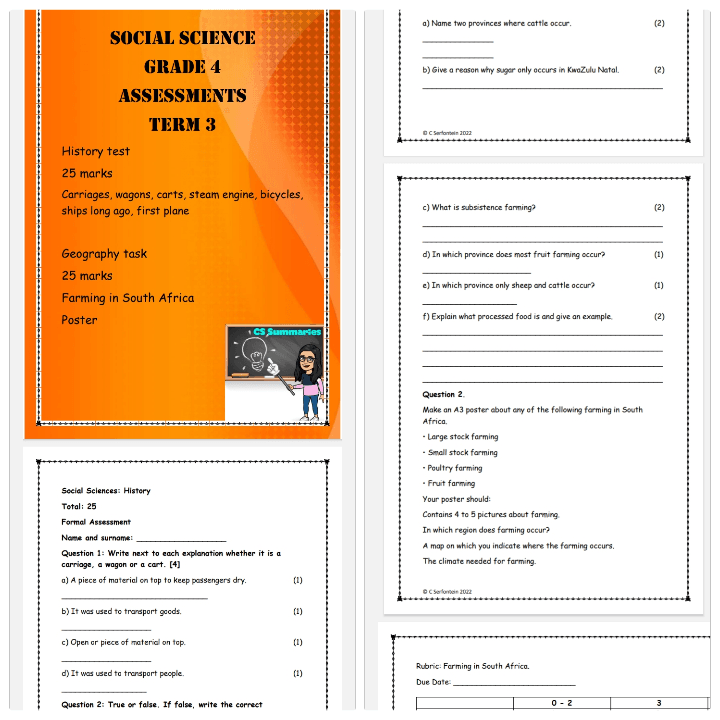
Social Sciences Past Exam Papers and Memos: Grade 4 Facts in South Africa
Introduction
Social Sciences is a subject that encompasses a wide range of topics, including history, geography, economics, and civics. In South Africa, Social Sciences is taught in schools from Grade 4 onwards. The subject is designed to help learners understand the world around them and to develop critical thinking skills.
Past exam papers and memos are a valuable resource for learners who are preparing for their Social Sciences exams. These materials can help learners to identify the key topics that are likely to be covered on the exam, and to practice answering exam-style questions.
Grade 4 Social Sciences Exam Paper
The Grade 4 Social Sciences exam paper typically consists of three sections:
- Section A: Multiple choice questions
- Section B: Short answer questions
- Section C: Essay question
The multiple choice questions test learners’ knowledge of key facts and concepts. The short answer questions require learners to apply their knowledge to new situations. The essay question allows learners to demonstrate their understanding of a particular topic in more depth.
Grade 4 Social Sciences Memo
The Grade 4 Social Sciences memo provides learners with the correct answers to the exam questions. The memo also includes detailed explanations of the answers, which can help learners to understand the concepts that are being tested.
Using Past Exam Papers and Memos
Learners can use past exam papers and memos to prepare for their Social Sciences exams in a number of ways:
- Identify key topics: By reviewing past exam papers, learners can identify the key topics that are likely to be covered on the exam. This can help them to focus their studies on the most important areas.
- Practice answering exam-style questions: Past exam papers provide learners with an opportunity to practice answering exam-style questions. This can help them to develop the skills that they need to succeed on the exam.
- Check their understanding: Learners can use the memo to check their understanding of the concepts that are being tested. This can help them to identify any areas where they need to improve their knowledge.
Conclusion
Past exam papers and memos are a valuable resource for learners who are preparing for their Social Sciences exams. These materials can help learners to identify the key topics that are likely to be covered on the exam, to practice answering exam-style questions, and to check their understanding of the concepts that are being tested.
Facts in South Africa
In addition to the information provided in the exam paper and memo, learners may also find it helpful to review some key facts about South Africa. These facts can help learners to understand the context of the Social Sciences curriculum and to develop a deeper understanding of the country.
Geography
- South Africa is located at the southern tip of Africa.
- It is bordered by Namibia, Botswana, Zimbabwe, Mozambique, Swaziland, and Lesotho.
- South Africa has a coastline of over 2,500 kilometers.
- The country is home to a wide variety of landscapes, including mountains, deserts, forests, and grasslands.
History
- South Africa has a long and complex history.
- The first people to live in South Africa were the San and the Khoi.
- The Dutch arrived in South Africa in the 17th century and established a colony at the Cape of Good Hope.
- The British took control of the Cape Colony in the 19th century.
- South Africa became a self-governing colony in 1910.
- The country became a republic in 1961.
- South Africa was under apartheid rule from 1948 to 1994.
- Nelson Mandela became the first democratically elected president of South Africa in 1994.
Demographics
- South Africa has a population of over 59 million people.
- The country is home to a diverse population, with over 11 official languages.
- The majority of South Africans are black (80.9%), followed by white (8.9%), coloured (8.9%), and Indian/Asian (2.5%).
Economy
- South Africa has a developing economy.
- The country’s main industries include mining, manufacturing, and tourism.
- South Africa is a member of the G20 group of nations.
Government
- South Africa is a constitutional democracy.
- The country has a three-tier system of government: national, provincial, and local.
- The president is the head of state and government.
- The National Assembly is the country’s parliament.
Culture
- South Africa has a rich and diverse culture.
- The country is home to a wide variety of music, dance, and art forms.
- South Africa is also known for its cuisine, which is a blend of African, European, and Asian influences.